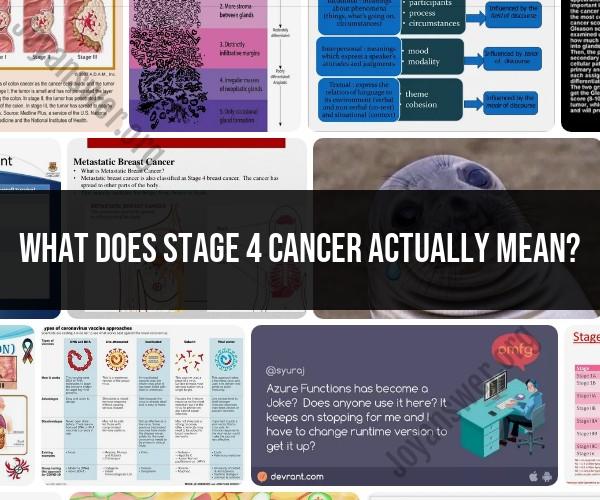What does stage 4 cancer actually mean?
Stage 4 cancer, often referred to as advanced or metastatic cancer, is a term used to describe cancer that has spread from its original site (the primary tumor) to distant parts of the body. It is the most advanced stage of cancer and typically indicates that the disease has progressed and become more challenging to treat. Here's what stage 4 cancer means:
Metastasis: Stage 4 cancer is characterized by metastasis, which is the spread of cancer cells from the primary tumor to other organs or tissues in the body through the bloodstream or lymphatic system. These distant sites where cancer has spread are called metastases or secondary tumors.
Primary Tumor: The primary tumor is where the cancer originated. In stage 4 cancer, the primary tumor may still be present and growing, but cancer cells have also invaded and established tumors in one or more other areas of the body.
Prognosis: Stage 4 cancer is generally associated with a less favorable prognosis compared to earlier stages of cancer. The prognosis depends on several factors, including the type of cancer, the location and size of metastases, the overall health of the patient, and the effectiveness of available treatments.
Treatment: Treatment options for stage 4 cancer may include chemotherapy, radiation therapy, targeted therapy, immunotherapy, hormone therapy (for certain cancers), and palliative care. The goal of treatment may shift from cure to controlling symptoms, improving quality of life, and prolonging survival.
Symptoms: Stage 4 cancer can cause a wide range of symptoms, depending on the organs or tissues affected by metastases. Common symptoms may include unexplained weight loss, pain, fatigue, difficulty breathing, jaundice, neurological symptoms, and others related to the specific sites of metastasis.
Cancer Types: Stage 4 cancer can occur in various cancer types, including breast cancer, lung cancer, colorectal cancer, prostate cancer, melanoma, and many others. Each type of cancer has its own unique characteristics and treatment approaches.
It's important to note that not all stage 4 cancers are the same, and prognosis can vary widely based on individual circumstances. Some people with stage 4 cancer may respond well to treatment and experience extended periods of remission, while others may have a more challenging course.
Diagnosis and management of stage 4 cancer typically involve a multidisciplinary team of healthcare professionals, including oncologists, surgeons, radiologists, and palliative care specialists. The treatment plan is tailored to the specific type and stage of cancer, as well as the patient's overall health and preferences.
For individuals diagnosed with stage 4 cancer, open and honest communication with healthcare providers is crucial to understanding treatment options, managing symptoms, and making informed decisions about care and quality of life.
1. Deciphering Stage 4 Cancer: What It Means and What to Expect
Stage 4 cancer is the most advanced stage of cancer. It means that the cancer has spread from its original location to other parts of the body, known as metastasis. Stage 4 cancer can be difficult to treat and cure, but there are many treatment options available that can help to prolong life and improve quality of life.
What to expect:
- Treatment: The treatment for stage 4 cancer will vary depending on the type of cancer, the location of the cancer, and the overall health of the patient. Treatment options may include surgery, chemotherapy, radiation therapy, targeted therapy, and immunotherapy.
- Side effects: The side effects of treatment for stage 4 cancer can vary depending on the type of treatment used. Some common side effects of cancer treatment include fatigue, nausea, vomiting, hair loss, and pain.
- Prognosis: The prognosis for stage 4 cancer varies depending on the type of cancer and the patient's individual circumstances. However, it is important to note that stage 4 cancer is not always a death sentence. With proper treatment, many people with stage 4 cancer are able to live for many years.
2. Stage 4 Cancer Explained: Understanding the Severity of the Diagnosis
Stage 4 cancer is the most advanced stage of cancer, but it is important to note that it is not always a death sentence. With proper treatment, many people with stage 4 cancer are able to live for many years.
The severity of a stage 4 cancer diagnosis depends on a number of factors, including:
- The type of cancer: Some types of cancer, such as leukemia and lymphoma, are more responsive to treatment than others.
- The location of the cancer: Cancer that has spread to vital organs, such as the brain or liver, is more difficult to treat.
- The overall health of the patient: Patients who are in good overall health are more likely to respond to treatment and have a better prognosis.
3. Navigating a Diagnosis: Insights into Stage 4 Cancer and Its Implications
A diagnosis of stage 4 cancer can be overwhelming and life-changing. It is important to have a support system in place during this time. You may want to talk to your family and friends about your diagnosis, or join a support group for people with cancer.
It is also important to learn as much as you can about stage 4 cancer and your treatment options. You can talk to your doctor about the best course of treatment for you, and you can also do your own research online or in libraries.
Here are some additional insights into stage 4 cancer and its implications:
- Stage 4 cancer is not always a death sentence. With proper treatment, many people with stage 4 cancer are able to live for many years.
- Treatment for stage 4 cancer can be challenging, but it is worth it. Treatment can help to prolong life and improve quality of life.
- It is important to have a support system in place. Talking to your family and friends about your diagnosis, or joining a support group for people with cancer, can help you cope with the emotional and physical challenges of living with stage 4 cancer.
- It is important to learn as much as you can about stage 4 cancer and your treatment options. This will help you make informed decisions about your care.
If you have been diagnosed with stage 4 cancer, please know that you are not alone. There are many resources available to help you navigate this difficult time.












